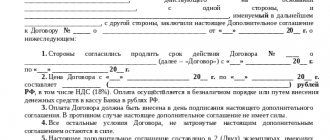Home / Labor Law / Dismissal and layoffs / Dismissal
Back
Published: 04/13/2016
Reading time: 8 min
0
719
Any work carried out under a fixed-term employment contract is performed by an employee of an enterprise or organization only for a certain period.
According to the law, this period cannot exceed five years..
Typically, such contracts terminate upon expiration of the period of work specified in the document (Article 79 of the Labor Code). The legislation also provides for early termination, including at the initiative of the management of an enterprise or organization. The full list of workers who can be dismissed early is listed in the Labor Code - Article 81.
- Grounds and reasons for termination
- How does termination occur?
- Settlement with an employee
- Differences between urgent and early termination
What is meant by a fixed-term employment contract?
As mentioned above, Russian labor law does not recognize fixed-term contracts between an employee and an employer if they specify a period exceeding five years. Accordingly, any contract that specifies an incorrect expiration date is open-ended.
For example, the parties sign the agreement in March 2018, and plan to end their employment agreements in December 2024. From the point of view of the legislator, such an agreement should be considered unlimited - with all the ensuing consequences.
Typical examples of work in which a fixed-term contract is concluded
A fixed-term employment contract is concluded for a temporary period of up to five years. According to established practice, the most common reasons for signing this type of contract include the following:
- all kinds of seasonal work (agricultural, fishing, etc.);
- preparatory stages for the launch of production (start-up, commissioning and other operations);
- the entry of a new specialist to replace a permanent employee who has left for a certain period of time, but whose job must be retained (for example, in the case of maternity leave);
- entry into an elective position with a prescribed period for exercising the assigned powers.
As a general rule, fixed-term contracts terminate upon the arrival of the date specified in them or the achievement of the result specified in the text of the document. However, due to various reasons, the parties may terminate the employment relationship without waiting for “day X”.
All about compensation
When a fixed-term contract with an employee is terminated, the dismissal procedure includes the payment of compensation. It is identical to the procedure with an open-ended contract. On the last day (before permanently leaving the current position), the employee receives:
- Money that was actually earned but not paid.
- A benefit in the amount of the average monthly salary, provided that the company ceases operations (or the second option, when the staff is reduced and the position is abolished).
If an employee, when closing a company or individual entrepreneur, does not agree to move to a new job, or for objective reasons it is impossible to transfer him to another company, in order to receive benefits, he must register with the employment center. You need to do this within 14 days after the contract expires. It is important that he is not in a new position at the time of payment.
Also, upon dismissal at the initiative of the employer, unused vacation pay must be paid. What compensation is due? Read our article in detail.
Russian legislation provides information that for each month worked, 2.33 vacation days are due - provided that the duration of the fixed-term contract exceeds 2 months. For shorter contracts, 2 days of vacation pay are required per month. If an employee was at work for 15 days or more (for February - 14 days), he receives compensation based on 1 month worked.
In what situations can an agreement be terminated prematurely?
Based on the provisions enshrined in the articles of the Labor Code of the Russian Federation, it is possible that the employment relationship may be terminated before the expiration of the initially agreed terms for a number of reasons:
- by agreement of both participants;
- at the initiative of superiors;
- at the personal request of the employee.
The subtleties and details of the first two points are given in Articles 77, 78 and 81 of the Labor Code. At the same time, the nuances of terminating a fixed-term contract are included in a separate article - it is assigned number 79.
Article 79. Termination of a fixed-term employment contract
We described the intricacies of terminating a fixed-term employment contract upon expiration in this article. The procedure for dismissing an employee, grounds for termination of a contract and analysis of judicial practice. Excerpts from labor legislation and sample documents are attached.
If the contract has expired but the work has not been completed
The organization entered into fixed-term employment contracts with a team of construction workers to perform temporary work on the construction of the facility. The contracts indicate that they are drawn up to perform temporary (for a period of no more than two months) construction work. The event that determines the completion of work is listed in the contract as “completion of construction.” But due to the slow work of the team, the facility was not built in two months. Is it possible in this case to dismiss employees due to the expiration of their contracts?
When concluding a fixed-term employment contract, the employer must remember the need to strictly follow the conditions for termination of the contract that are recorded in it. Therefore, if the moment of termination of the contract is determined by the occurrence of an event, in particular, the completion of construction of the facility, then termination of the contract before the actual completion of construction will be unlawful. Indeed, according to the rules of the article of the Labor Code of the Russian Federation, an employment contract concluded for the duration of certain work is terminated upon completion of this work. This means that if a dispute arises regarding the dismissal of an employee, the organization will have to confirm that at the time of his dismissal the work was actually completed. That is, she will have to submit the relevant acts (acceptance, commissioning, etc.). It will not be possible to terminate an employment contract to perform temporary work due to the expiration of the two-month period established in the article of the Labor Code of the Russian Federation as the maximum period for which such an agreement can be concluded.
Therefore, in the situation under consideration, the employer will either have to resolve the issue of extending (renegotiating) employment contracts, or dismiss employees “under the clause”. For example, on the basis of paragraph 5 of part 1 of the article of the Labor Code of the Russian Federation in connection with repeated failure to fulfill one’s labor duties without good reason. However, in this case, it is necessary to correctly and in advance take the actions necessary for such dismissal. In particular, it is necessary that employees be subject to disciplinary action (reprimand or reprimand) during the period of performance of work (i.e. before the expiration of two months).
Why can an employee terminate a fixed-term contract?
The main difference between a fixed-term employment contract and an open-ended one is the presence in the text of the first end date of the period for which a person becomes an employee of the current employer. Otherwise, these two forms of employment contracts differ little from each other in any significant way.
Accordingly, the legislator considers the termination of a fixed-term contract as a separate, but practically similar to general practice procedure. The difference here lies only in some details, the most important of which we will discuss in more detail below.
As for the reasons based on which an employee can initiate the dismissal procedure at his own request, they can be very different: from respectful and force majeure to a spontaneous decision. In any case, these actions will fall under the provisions of Article 80 of the Labor Code of the Russian Federation, which talks about the termination of the contract between the employer and the employee at the initiative of the latter.
Article 80. Termination of an employment contract at the initiative of the employee (at his own request)
Thus, the legislator recognizes the right of a person working under fixed-term employment to terminate his employment relationship with his current employer. Strictly speaking, a person who wants to terminate a fixed-term contract is not obliged to give any explanation for his decision. He is only required to fulfill a number of conditions prescribed by the provisions of labor legislation.
The procedure for dismissing an employee on a fixed-term contract at his own request
The only obligation imposed on a person who decides to terminate a fixed-term agreement without waiting for the date agreed upon when signing it is to provide advance notice of such intention.
Termination of a fixed-term employment agreement can occur either by mutual agreement or by the sole decision of the parties
In situations where the agreement is concluded for a period of two months or a longer period of time, the employee is obliged to notify management of the desire to stop working two weeks before the planned date of termination of the contract. If we are talking about a contract initially designed for a period of less than two months, it is enough to notify three days in advance.
At the same time, the employer’s representatives do not have the legal right to prevent the early termination of the existing contract. The employee who announced his dismissal and supported this with an appropriate statement continues to work out the days required by law and receives a full payment on the last day. Moreover, in practice there are often situations when the employer does not insist on this “working off” and is ready to part with the employee in a shorter period of time than specified in the law.
Reasons why an employee may resign early
The Labor Code cites several points as reasons that may serve as grounds for termination of a fixed-term contract at the request of an employee. It should be emphasized that the law lists the main, but not all, options. That is, this list is not exhaustive and closed.
Table 1. Situations that may become a reason for voluntary dismissal
| Article TC | Cause |
| 79 | The period for which the current employment agreement was intended has expired |
| 72.1 | The employee does not agree to follow the employer to another location |
| 75 | The company has changed management or undergone reorganization |
| 72.2 | Refusal of an employee to move to a new position offered to him |
| 72 | Making changes to the terms of an employment contract that do not suit the employee |
| 77 | Other arguments that are significant for a person working as a fixed-term employee |
The employee may not give any reasons at all for his decision “on his own” in the application. However, if he wants to quit without the work required by law, and his boss is not inclined to allow him to do so, the reason will still have to be documented. Upon provision of the necessary papers and certificates, the agreement is considered terminated by agreement of both parties.
How to correctly write a statement of your own free will?
An application on behalf of an employee who is bound by a fixed-term contract and wants to terminate it is typical for generally accepted document flow. It must include an indication of the full names of the parties between whom this agreement was concluded, the text itself with a request for early termination of the employment relationship, as well as the date and personal signature of the person submitting the application.
It doesn’t matter what the reason for dismissal is - the employee can leave at any time by notifying his superiors in advance
The question of whether to indicate or omit the reasons that prompted a person to terminate the contract early is left to the discretion of the author of the application. Let us remind you that the number of days that he will have to work after submitting an application to the employer may directly depend on what arguments the employee resorts to.
Upon receipt of this application, the employer’s representative responsible for personnel records management is obliged to issue an order to dismiss the employee in accordance with the provisions of Article 80 of the Labor Code. The applicant confirms the fact of familiarization with the order with a personal signature.
Sample application for voluntary resignation
Important point! An employee who has declared his desire to terminate a fixed-term contract, by law, has the right to withdraw the application paper on any of the days of compulsory service. If the boss did not have time to hire a new employee to replace the resigning employee at that time, the applicant retains his position and continues to work. Roughly speaking, it is believed that he never filed an application to terminate the contract. Refusal to cancel the dismissal paper can only be given upon signing a full-fledged employment contract with the new employee.
Reasons
The basis for termination of an employment agreement is reflected in Article 79 of the Labor Code of the Russian Federation; it is associated with the end of the validity period of the concluded contract. The employee is notified three days before the specified date. Otherwise, the agreement becomes indefinite. The basis on which the temporary agreement was concluded must be taken into account, then the moment of termination becomes different. Eg:
- an employee with whom a permanent contract has been concluded goes to work;
- the work for which the employee was hired has been accepted;
- the season is over;
- the employee returned from abroad;
- the organization is liquidated due to the completion of the activity for which it was created;
- other factors reflected in Article 59 of the Labor Code of the Russian Federation.
There may be many reasons for terminating a fixed-term agreement. They are spelled out in Chapter 13 of the labor legislation. These include the agreement of the parties to the labor relationship, the end of the period of validity of the document, and the desire of the employee. The employer can also take the initiative, subject to certain conditions; there may be other grounds that do not depend on the parties to the agreement.
The provisions of Article 78 of the Labor Code provide for the possibility of terminating the employment relationship at any time with the consent of both parties to the contract. Termination is initiated by one party, the second gives its consent to such a procedure. In order for an employee to leave the enterprise, he must write a corresponding statement, which is then submitted to management.
What are the consequences of terminating a contract at the initiative of an employee?
As already emphasized above, during all working days, the status of the employee who wrote the application is no different from that of an ordinary employee. He continues to fulfill all the labor duties assigned to him by the employer, since each day of this work will be paid to him in full upon receipt of the payment.
The counting of days of compulsory service begins on the day following the date of submission of the application. The date of early termination of a fixed-term contract is not the day when the employee signed the order for his own dismissal, but the day of his last return to work. It is then that the person is given a work book, where the corresponding entry is first made. At the same time, the former employee receives a full payment from the ex-employer’s accounting department.
In the event that on the final day of work all the above-described procedures were not completed, and the employee does not stop performing his job duties, this situation is fully considered as a refusal to dismiss. This, in turn, may lead to the recognition of an application submitted earlier as annulled.
Obviously, an immutable condition of a fixed-term employment contract is a time frame. The logical conclusion from this thesis is the following: the party taking the initiative to terminate an agreement of this type early is considered responsible for potential failures to meet the deadlines specified in it. However, any claim of this nature can be ignored if the employer agrees to this.
If the employer has claims against the employee, they must be resolved with the participation of the labor commission. After this stage is completed, the case may proceed in court if the parties do not reach a compromise.
In what order does dismissal occur if the initiator is an employee?
Dismissal of an employee
Every person, no matter what their status, has the right to terminate an employment agreement.
This does not mean that an employee who has performed his duties under a fixed-term contract can terminate them without notifying the employer.
The application is submitted in accordance with the general procedure with a warning to superiors 2 weeks before the expected departure.
The deadline is provided so that the head of the company can fill the gap and find a specialist capable of completing the scope of work.
When making an agreement to carry out specific two-month obligations, the message must be received three days before termination. Short-term agreements will be concluded to carry out seasonal agricultural activities. It is envisaged that all settlement transactions will be carried out on the last working day with the receipt of earned money and a work book.
Continuation of work serves as a consequence of his refusal to dismiss, and a valid reason may affect the speed for termination of work.
Tips for those who accept the option of early dismissal
Labor dispute specialists recommend that before concluding a fixed-term contract, you carefully study the entire text of the contract and substantively discuss each clause that affects the mutual obligations of the future employee and his employer. This precaution will help to identify points that may subsequently be interpreted as violations of the terms of the fixed-term contract being signed.
This clause primarily applies to professional athletes. According to Article 348.12 of the Labor Code of the Russian Federation, breaking a fixed-term contract for them may be fraught with the payment of a serious penalty to the employer if there is no compelling reason to terminate the contract.
Article 348.12. Features of termination of an employment contract with an athlete or coach
All other participants in labor relations do not face such costs in a similar situation, however, they should also think through all actions in advance - and only then voice a decision on early termination of the contract with the wording “on their own.” Ideally, the possibility of terminating a fixed-term employment contract should be provided for even before it is signed by the employee and the employer.
Video - Grounds for termination of an employment contract
Termination of the employment contract. Possible methods
The first thing to understand when considering termination of an employment contract is that there is a strictly established procedure for its termination, any violation of which, in fact, is a violation of the Labor Code of the Russian Federation. All legal ways to terminate an employment contract can be divided into 4 categories :
- By mutual agreement of the parties;
- At the request of the employee;
- At the request of the employer;
- Due to circumstances.
These categories are very compact and contain dozens of different ways to terminate the contract. Let's look at them all in order.
Termination of an employment contract by mutual consent of the parties
By mutual agreement of the parties
Perhaps the easiest, fastest and most comfortable way to terminate an employment contract. Unfortunately, they rarely use it. It implies a simplified procedure for terminating labor simplifications, in which issues of work, payments, compensation and other things are resolved between the employee and the employer on a voluntary basis. Most often, this occurs if an employee retires, is unable to work due to deteriorating health, or quits to care for a sick relative or disabled person. The process itself is a process of terminating the contract on the initiative of the employee, but devoid of most of its legal features.
Termination procedure
Expert opinion
Kostenko Tamara Pavlovna
Lawyer with 10 years of experience. Author of numerous articles, teacher of Law
In order to terminate a fixed-term employment contract at the end of its validity period, the employee should prepare a notice of termination of this document. If this is not done, then the employer faces the risk of recognizing the contract as indefinite.
An agreement that was signed to perform previously fixed work is terminated upon its completion (under Part 2 of Article 79 of the Labor Code) or upon completion of seasonal work (under Part 4 of Article 79 of the Labor Code).
In order to warn an employee about the upcoming termination of an employment contract, it is necessary to send him at least three days notice . The notification is sent in writing signed by the second employee.
The notification is signed by the head of the organization or an authorized employee (usually a human resources specialist). If the signatory was not given the appropriate authority, then the dismissal may be considered illegal.
The fact of termination of a fixed-term employment contract is confirmed by an order, which the employee is also familiarized with by signature.
A note on the termination of a fixed-term employment contract is entered in the work book.
What compensation is due?
Compensation payments are provided for by law in accordance with Article 127 of the Labor Code. The regulatory provisions of this law concern, first of all, compensation for all days of annual leave (if it was not used in the current year), as well as for additional leave spent by women with their children (care leave), if any.
Payments are made in accordance with Articles 278 and 279 of the Labor Code. The employee receives total compensation, including unpaid wages and compensation payments for vacation that they have not yet used in the current year.
And severance pay (an average wage for two weeks) is paid by law only to certain categories of workers (unless otherwise provided for in an individual or collective employment contract). For example, if an employee does not agree with changes to the provisions of the employment contract, does not want to move to work in another area, is called up for military service, or is forced to stop working due to complete disability.
This is important to know: What is the time frame for considering written requests from citizens? What to do if they are violated?
The right to revoke this document is present all the time until the expiration of the warning period recorded in the application.
Do you want to resign of your own free will without work? Find out how this can be done by reading our article.
Don’t want to “work off” before you quit? Then the best option for you would be to take a vacation followed by dismissal. How to implement this correctly, read our material.
Document flow upon dismissal of an employee
It is necessary to consider what the employer is obliged to provide from a documentary perspective. It was previously noted that the employee is notified in writing that there are unresolved reasons for continuing the employment relationship. Such a notification must contain the signature of the manager or his deputy, as well as any person who, within the framework of the job description, can sign documents of a similar degree of importance. The notice states the actual reasons why the employment contract is terminated, the full name and position held, the employee’s postal address (this may be useful if the information is sent by mail), the start and end dates of the fixed-term employment contract.
Companies with large staff usually have their own sample of such notice of dismissal
The document is transmitted in any way that is convenient for the employee. The main condition is that the employer must know for sure that the notification has reached the addressee. Otherwise, the dismissal procedure can be challenged.
Sometimes situations arise when, after reading the text of the notice from the place of work, the employee does not agree with this decision. Then they sign an act of refusal. Three signatures are placed on it (including two witnesses). Legally, this paper cannot slow down the progress of the case if there are no flagrant violations (pregnancy of the employee and other reasons mentioned above), but it must be drawn up and attached to the case. This will help avoid unnecessary misunderstandings in the future if you have to defend your position in court.
There is no single form for acts of refusal to receive notification. Here, as in the case of the text of the notice itself, the company has the opportunity to draw up its own document.
However, there are required components. These include:
- Full company name.
- Passport details of witnesses.
- Brief description of the reason for dismissal.
- An indication of the fact of refusal to receive the paper with an explanation of the reason.
- Signatures of the employee and witnesses with transcripts, confirmed by the seal of the organization.
Example. We, the witnesses who signed below, have drawn up this act due to the fact that the staff is being reduced, of which senior manager Olga Vladimirovna Petrova was notified within the framework of the labor legislation of the Russian Federation. The information was transmitted 2 months before the upcoming dismissal. Olga Vladimirovna refused to accept and sign it and does not motivate this in any way.
The general recommendation for sending notice to furloughed employees is to send it by mail only when it cannot be delivered in person. If you still need to use the services of a postman, preference should be given to a registered letter with notification. An inventory must be drawn up - this will help when appealing in court.
When an individual entrepreneur separates from his employees, he uses an extract from the register indicating the closure of the business.
An extract from the register on the closure of a business will serve as the basis for termination of all contracts
Features for certain categories of workers
Termination of a fixed-term employment contract with certain categories of employees has certain nuances. In particular, the legislation specifically protects the right to work of pregnant women.
For this category of employees, the employment contract is extended until the end of pregnancy or until the end of maternity leave (according to Part 2 of Art.
261 of the Labor Code).
At the same time, in order for the employment contract with a pregnant woman to be extended, she should:
- Confirm your pregnancy with documentation (in particular, a medical certificate).
- Submit an application to the employer to extend the term of the contract.
When extending the contract until the end of pregnancy, a woman should undergo a procedure to confirm the fact of pregnancy every three months (that is, constantly take a new certificate from the antenatal clinic).
The employer will have a week to dismiss from the day he learned about the end of the employee’s pregnancy. When a woman goes on maternity leave, she can be fired on the day it ends.
Expert opinion
Kostenko Tamara Pavlovna
Lawyer with 10 years of experience. Author of numerous articles, teacher of Law
Moreover, all vacancies offered by the employer must correspond to the woman’s health condition and can be either highly paid or low-paid.
For employees working remotely, employed by an individual, or working from home, the grounds for dismissal may be provided for in the employment contract itself.
The employment contract of foreign employees expires upon termination of their stay in the Russian Federation or the validity of their work patent, or upon cancellation of their work permit.
Athletes can be fired if they are disqualified for more than six months or for doping.
This is important to know: How funds are collected under a loan agreement between individuals
Termination procedure
When dismissal of this type, the general norms established by law for the termination of any employment contracts are observed.
The employee's main responsibility is to promptly notify the employer in writing of his desire to leave his place of work. Moreover, this time is strictly regulated by the provisions of the Labor Code, and the period for filing a notification is somewhat different for different categories (and is regulated by different articles).
According to the general rules reflected in Article 80 of the Labor Code, the employer must be warned in writing fourteen days before dismissal. This procedure works in most cases.
However, there are exceptions to this rule. If a contract was concluded with an employee for a short period of up to two months, he is obliged to send a notice at least three days before his departure (Article 292 of the Labor Code). If we are talking about seasonal work, the notification is also sent within three days (Article 296 of the Labor Code).
For heads of organizations, enterprises or their representative offices, it is recommended to send a notice one month before dismissal (Article 280 of the Labor Code). In this case, the owners will have time to find a worthy replacement for the previous manager within a month.
Also, a one-month period for sending a notification is provided for athletes and coaches, provided that their contract is concluded for a period of at least four months (article number 348.12 of the Labor Code).
Another inalienable right of an employee given to him by the legislation of the Russian Federation provides for the withdrawal of a notice of dismissal during the period of validity of the notice (a period from three days to a month for different categories).
The procedure for completing the necessary documents is as follows:
- The employee writes by hand or prints a statement, which is also a notice, and submits it to the employer. Such a warning is given not only during work, but also while on sick leave or paid leave. The document contains a request for dismissal and indicates the date of dismissal. A signature is placed at the bottom and the date of filing the document is recorded (it must comply with legal requirements, that is, be indicated 14 days, 3 days, or one month in advance).
- The employer issues a corresponding order in form T-8, which indicates the basis (employee’s application, his registration number and date of submission). The date of dismissal is also stated.
- The order is signed by the employee who submitted the application.
- After which the corresponding entry is made in the work book (77th article of the Labor Code). The basis is the order (its number and date of issue are indicated).
- Accounting staff accrues funds due to the employee. Payment is made on the day of dismissal. Also on this day, a work book and other documents that were required when drawing up an employment contract are issued against signature.
It should be noted that the employee has the right to stop working on the day specified in his notification application, even if the order was not issued!
And if another employee belonging to a preferential category is invited to fill a vacant position, dismissal will be carried out, even if the employee changes his mind and decides to withdraw the notice of dismissal. Such beneficiaries include pregnant women and women supporting children under three years of age, as well as caring for children with disabilities. Also, preferential employment is provided for persons who resigned a month ago from the same enterprise in connection with a written invitation to another job (who left as a transfer).









